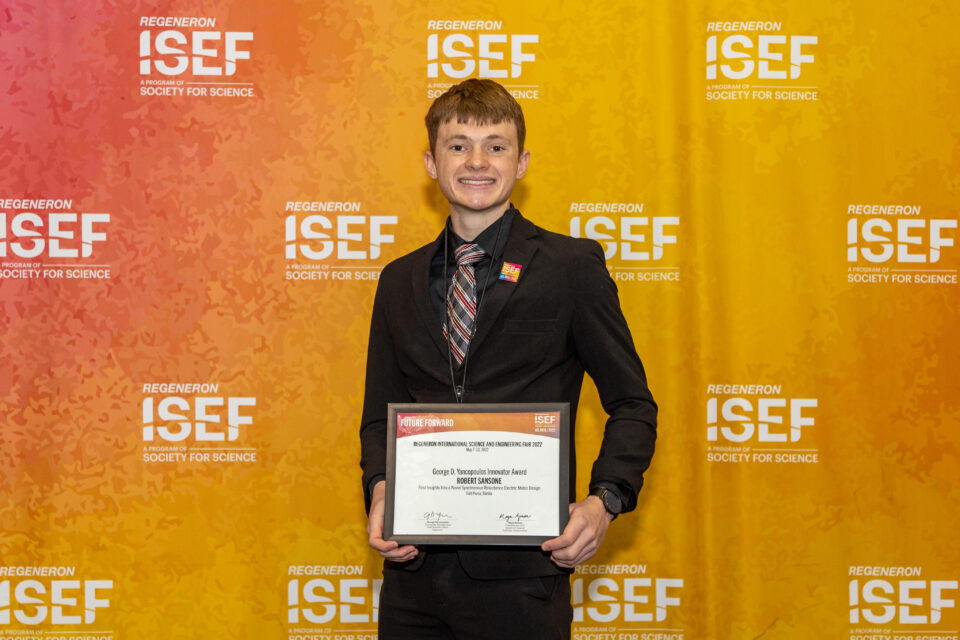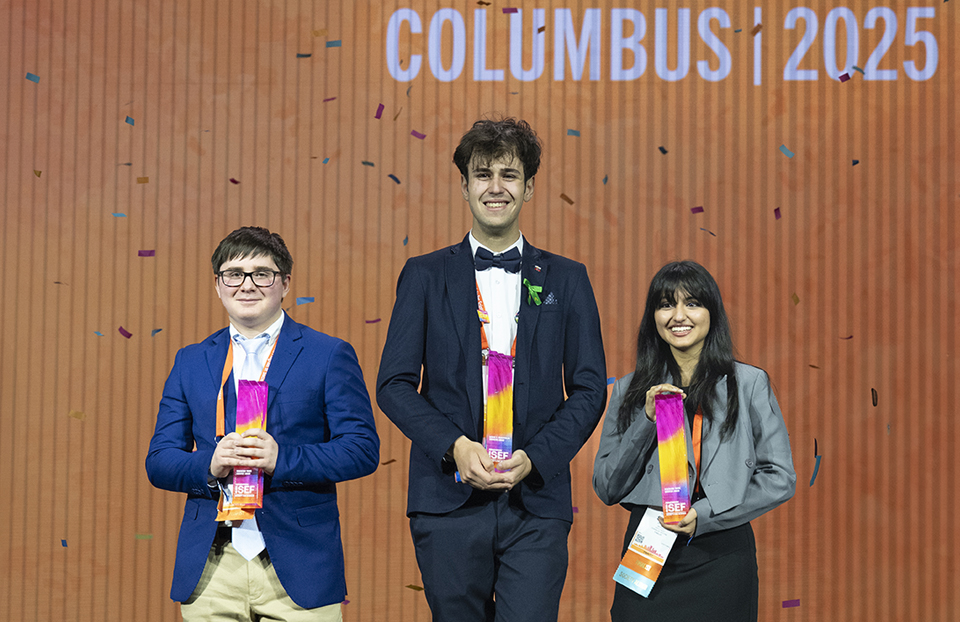Regeneron ISEF, Young & Amazing
Five Questions with Robert Sansone, winner of the 2022 $75,000 George D. Yancopoulos Innovator Award

Currently a senior at Fort Pierce Central High School in Fort Pierce, Florida, Robert Sansone made headlines last year after winning the prestigious George D. Yancopoulos Innovator Award for a project in the field of electric motor design. Robert, a passionate young innovator, developed a potential technology that could make electric vehicles truly sustainable by limiting the use of rare earth materials, which raises significant environmental concerns, particularly due to their adverse effects on resource sustainability and the creation of hazardous waste. With a strong concern about the environment, Robert’s work garnered significant national media attention and has been featured in prominent publications such as Smithsonian Magazine, The 74, and the World Economic Forum. We had the opportunity to catch up with Robert and hear about what winning the top $75,000 award meant to him last year.
Let’s hear more from him below.
What does it mean to you to come in as the top winner at ISEF 2022?
Winning ISEF has meant a lot to me because I am very passionate about the research that I do, and I put a tremendous amount of effort into my work (over 1,000 hours to complete my ISEF project from initial concept to completed study). I did not pursue my research to win competitions, but it is very gratifying to have my work recognized on such a grand scale. Winning the competition has also meant that I now have the money to pay for college, allowing me to further my passion and career aspirations in engineering.
What was your most memorable experience from ISEF?
Besides winning the competition, my favorite experience was making new friends on judging day. Judging day was very busy, but I got the chance to speak with the participants whose booths were adjacent to mine in between my interactions with judges. I not only got to talk with them about their research but also about their journey to ISEF and a little about what their life is like at home. It was nice to hear the different stories and have casual conversations apart from the more technical presentations I gave that day. Even after the competition ended, I stayed in touch with a few of the participants and became good friends with them in the process.
Give us an update on any notable things you’ve been up to since ISEF.
Since competing at ISEF, I have continued my research on electric motor design beyond the initial study that I presented at the competition. I recently acquired access to electromagnetic simulation software, and I am currently learning how to use it. Once I am proficient with the tool, I will be able to conduct simulated experiments on my electric motor, which will give me deeper, more accurate insights into the performance of the new design I created.
Which sci-fi advancement do you wish we had by now?
One sci-fi advancement that I wish humanity had by now is a technology that would allow humans to instantly download information into their minds. The ability for people to learn new things is a limiting factor for the rate of technological progress as each generation starts from scratch, meaning that people must devote significant portions of their life to learning so that they can even begin to help advance technology. If every person could instantly download all the current information that humanity collectively has, each generation could focus solely on discovering new information instead of starting out learning information that the previous generation already knew. I believe that this kind of advancement would increase the rate of technological progress to an unimaginable level.
What would you invent if you had all the resources in the world?
This would take more resources than the entire world has to offer, but if obtaining the necessary resources was not a problem, I would design a Dyson sphere that surrounds the sun to capture significant amounts of its solar output. Such a device could not only power the entire world for billions of years but also harness enough energy to accomplish more extravagant feats, like transporting the entire solar system to different parts of the universe so that it can be explored without having to leave the planet.
What would you say to inspire the next generation of scientists?
To the next generation of scientists, I would say: there is no need to wait until college or a job to start pursuing STEM. Though a lack of resources can often be a barrier to entry for STEM research, especially for young people like me, I have come to find that there are ways around limited resources. When I was working on my project, I did not have the necessary equipment to conduct my study or even a mentor to help me when I faced issues, but I ended up gathering accurate data nonetheless using what I had available, and I solved problems myself through lots of trial and error. In fact, minimal resources can sometimes lead to more creative solutions to problems and provide valuable learning opportunities. If there is something in STEM that seems interesting, do not wait to start exploring it.
Get involved in the world’s largest pre-collegiate STEM competition, Regeneron ISEF 2023! Join us in Dallas, Texas from May 14-19 for a fully in-person event where over 1,700 high school students from around the world will compete for nearly $9 million in awards. Sign up as a volunteer or apply to be a Grand Award Judge today and help support the next generation of innovators!


